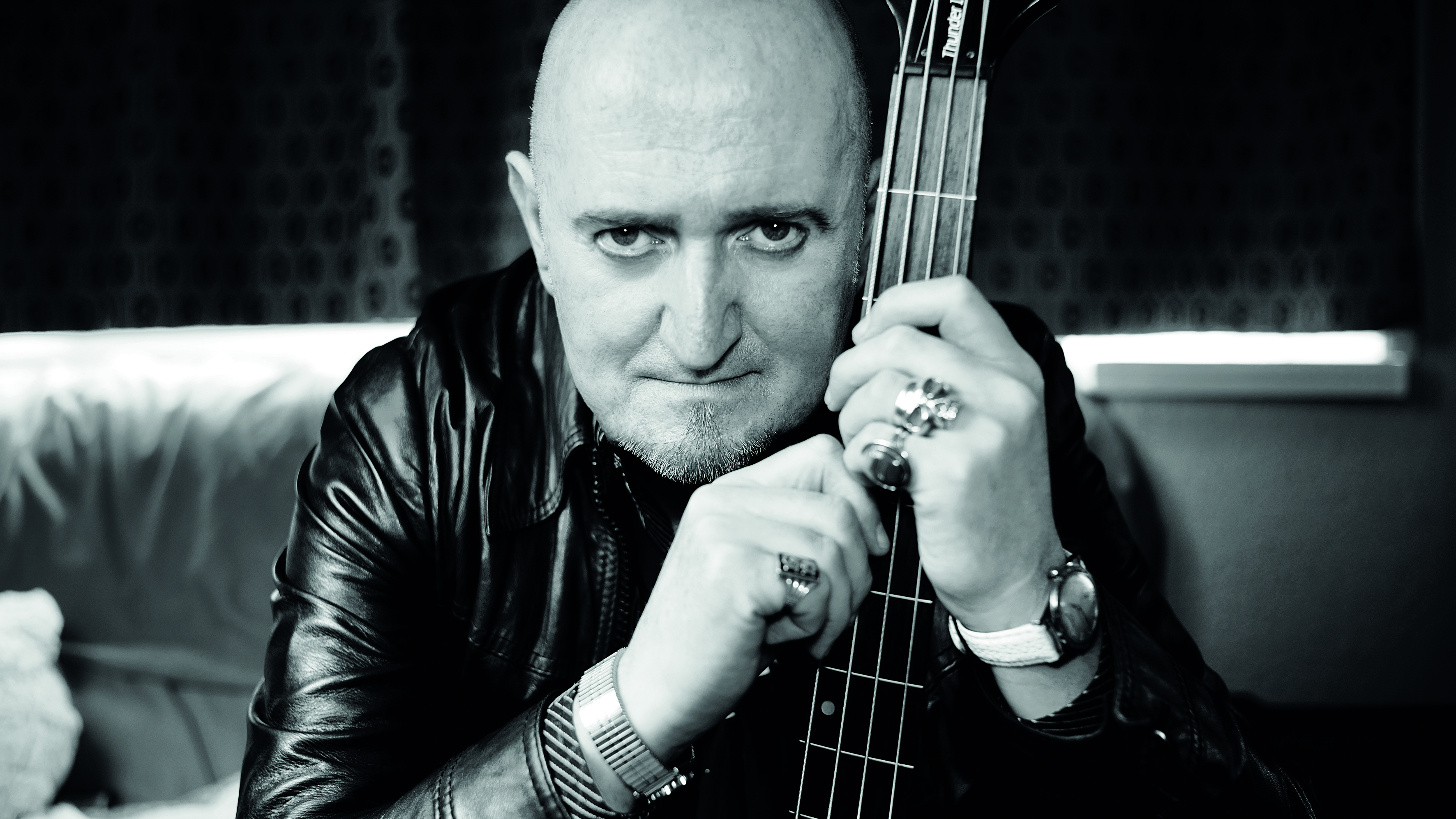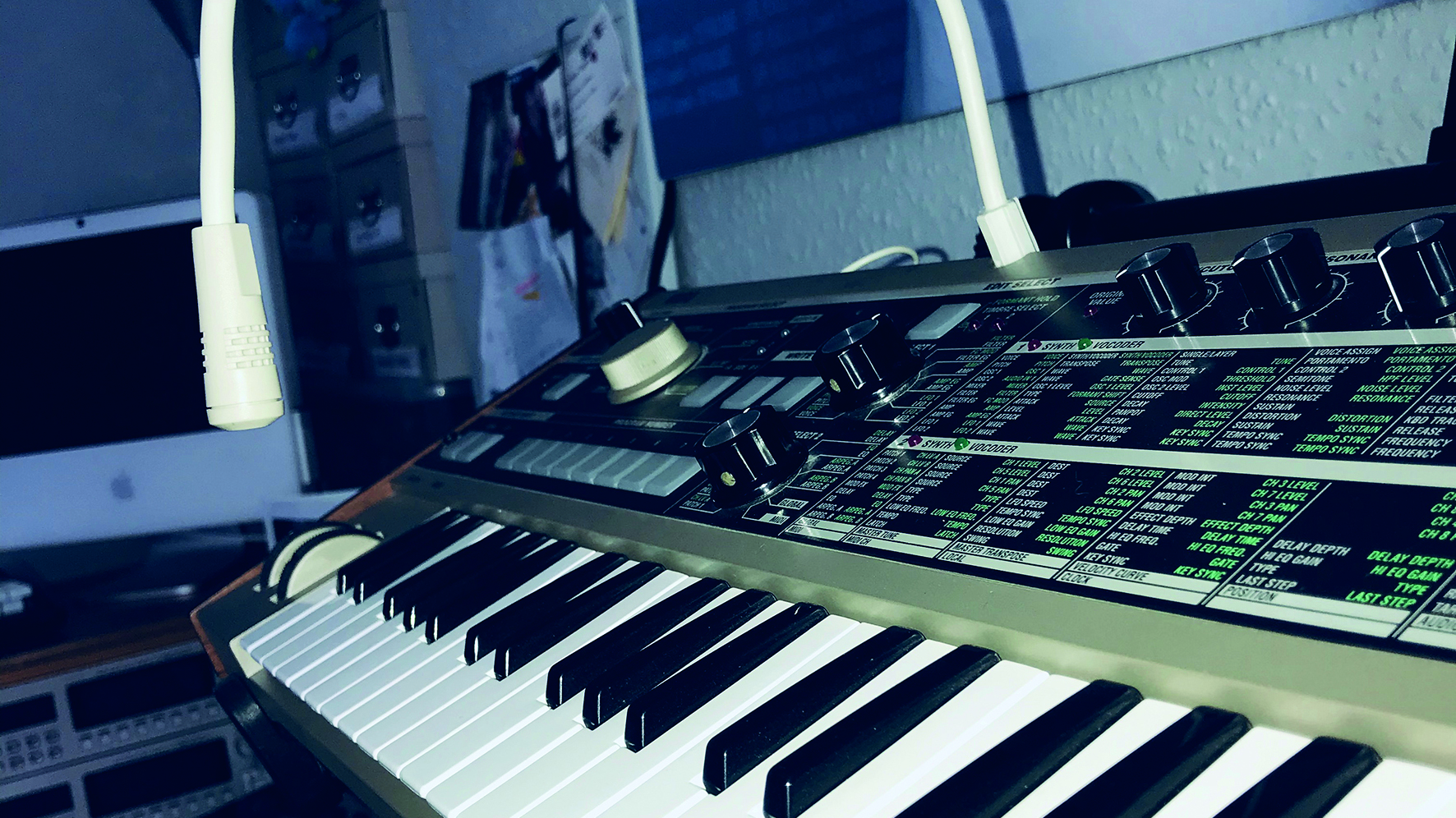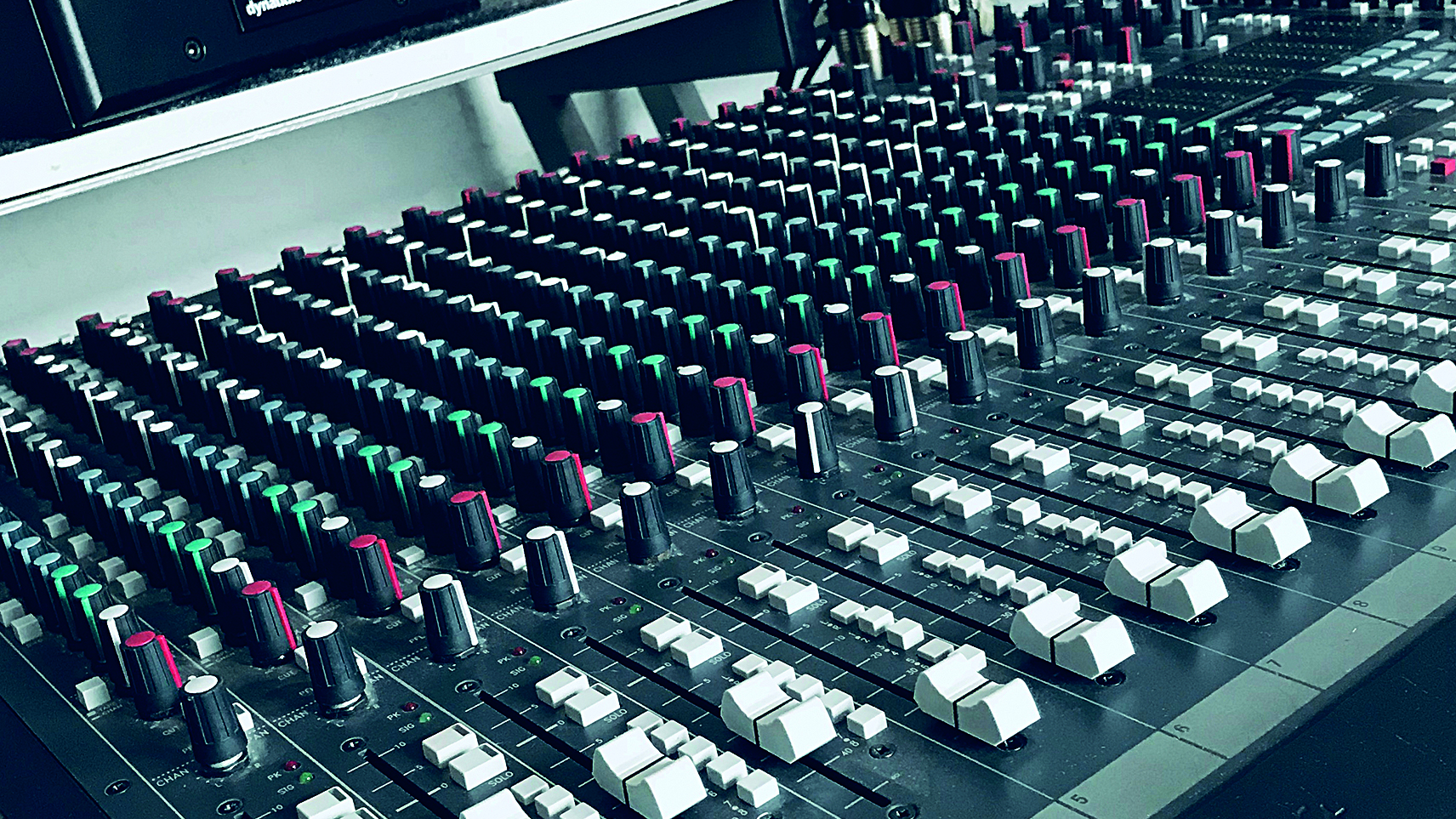She's Got Claws: "Years ago I’d have thought you were crazy if you’d said a computer was all you needed”
She’s Got Claws haven’t let a pandemic stand in the way of a fierce new record, co-produced by OMD legend Andy McCluskey

Want all the hottest music and gear news, reviews, deals, features and more, direct to your inbox? Sign up here.
You are now subscribed
Your newsletter sign-up was successful
Propelled by a wide-ranging passion for retro synth-pop, industrial rock and '90s electronica, Hull-based duo She’s Got Claws have been rapidly gaining plaudits and fans, enamoured by the pair’s intense dark sound and glam-recalling aesthetic.
From her home studio, vocalist, producer and frontwoman, Micci Lou, has been making music in this guise since 2011, initially as a solo electronic project, and now paired with longtime friend and accomplished bassist Chris O-Ten.
Last year, despite the pressures of lockdown, She’s Got Claws’ third album Doppelgänger was completed and released on solo label SGC Productions.
Impressively, it featured two tracks that were guest-produced by OMD figurehead and industry titan Andy McCluskey, his interest piqued by the unique aural character of this ferociously independent outfit.
We caught up with the duo to find out more about the process of crafting their last record, managing every aspect of their identity, and keeping focus in an often overwhelming technological world.
So Micci, can you take us right back to the beginning, and tell us how you discovered your affinity for music making and production?
Micci Lou: “Well, like many young girls, I always aspired to be a singer. I eventually got into singing for different producers on different tracks. I was really interested in how they used technology and equipment; at the time I was listening to a lot of people like Trent Reznor and The Prodigy, and wondered how I could get that kind of sound myself. I thought ‘well, why not just give it a go?’.
Want all the hottest music and gear news, reviews, deals, features and more, direct to your inbox? Sign up here.
"So since then I’ve been making and producing my own music. I’m inspired by lots of different types of artists really and did a lot of reading about the process. It was just trial and error that led us to the sound we have now.”
Can you tell us a little about your transition from old-school hardware to computer-based music-making? What’s some of the key gear in your setup?
ML: “It was a little bit of a shock. On my debut album I mainly used an Atari STE and S3000XL sampler, and I was just so used to working with a patchbay. I still have my 8-bus, 32-track Soundcraft Ghost mixing desk, but I was generally just used to being quite hands-on. Now I produce everything in Logic Pro X on my MacBook Pro, but still use the desk to monitor with.
"The plus thing about working mainly in-the-box is that there’s less setup time; it’s all a lot more spontaneous. I use an M-Audio Keystation 49 as my primary MIDI controller, and an Akai EIE USB interface. I tend to hang on to older gear, so I will need to have a bit of a sort out soon!
“Also in my studio (Chameleon Studios) I’ve got my Korg MicroKorg; it’s amazing how monstrous it can sound for something so tiny. I do like Korg gear, I’ve even got a Korg Prophecy (one of their earliest virtual analogue synths). I heard it on the Bowie album Earthling, and wanted to capture a similar sound.
“I’m trying to actually limit myself with sounds, because there’s a real danger of being overwhelmed by them; even in Logic, you can spend months and months exploring each instrument.
"It’s always great to have your go-to sounds. I use a soft synth called Dominator (by TA Programming) quite a lot. I like using ring modulators with that which you can hear on my track Hurtbeat and the track Adulation which opens Doppelgänger.
“Switching to computer music-making was the result of wanting to get my ideas down as quickly as possible. It’s taken me a while to get used to doing everything in my laptop. Just believing an entire studio exists within this tiny little box is mind-blowing. Years ago I’d have thought you were crazy if you’d said a computer was all you needed.”
What’s your typical approach to starting new ideas these days? Do you start with musical frameworks?
ML: “Now that Chris is onboard, we tend to start with bass. He’s always inspired me with his bass riffs; often they’re so strong that I can just build melodies around them. Occasionally I’ll start ideas with a beat, something simple in Logic that’s slightly effected perhaps, and then build it out. I know some people start with a top melody but I start from the bottom and then work my way up.”

Double trouble
So Chris, you’re now a key part of She’s Got Claws. How did you come to know and work with Micci, and what do you sonically bring to the table?
Chris O-Ten: “Well I’d known Micci for a while - we’d been in previous bands together and toured together. I’d recorded some bass for her debut as She’s Got Claws but returned as a full co-member for this record.
"Andy McCluskey, who we know, was listening to some early versions of our new tracks and asked if he could produce two that he really liked - Adulation and Love Lies Bleeding. It was actually Andy who inspired me to pick up bass guitar long ago.
"So it all came full-circle for me. I’ve got other bass heroes too, like Flea and Mick Karn, but it was watching OMD that first made me want to be a bass player.
“In terms of the bass sound on the record, I’ve got a few synth pedals in my board - I’ve got the Bass Mono Synth from Electro-Harmonix, the Bass Synth Wah from DigiTech along with compressor, cab simulation, micro chorus and Big Muff distortion. I like to write riffs this way and present them to Micci. As she says, she then builds up from there.”
Let’s talk about the Doppelgänger album. There’s such a range of songs on this record, and sounds that meld electronica, gritty industrial rock and some endearingly retro textures. Was it the case that these tracks were written specifically to be on the album, or had some been around for a while?
ML: “The majority were written with the album in mind but there were a couple that had been sat on the shelf for a while. Lying in the Dust and Musik we’ve been messing around with for a few years.
"The track Lying in the Dust would never quite fit anywhere even though it had a lot of potential. One day I was just experimenting with some beats, Chris came in and plugged in his bass and turned on all of his pedals. This massive dirty, distorted sound came out. It was huge, and Prodigy-esque - that was just a real moment of discovery. We decided that it would be a tribute to Keith Flint when it was finished.”
COT: “We channel inspiration from lots of different people. It’s amazing how many people that we really admire doubt what they’re doing.”
ML: “That’s part of being an artist, though - you do doubt what you do and that’s what drives you to improve. The day that you stop doubting is the day that you’ll never create anything. There’s always so much more to be learned. Music production is just a vast field. I learn as I go along.”
COT: “My dad was a swing band drummer in the '50s and '60s, and he said to me, ‘once you think you know it all, hang up your instrument’. That always stuck with me. The last track on the record is a remix of Musik which is by Andy McCluskey’s nephew. He did a really great job.
"The most popular track seems to be Love Lies Bleeding, a track that I wasn’t a fan of initially, but Andy produced it, and it’s become the standout in terms of streams. Micci always stood by it, and she was proven right. The fans love it.”

There are some really massive beats on this record that complement the multi-faceted synths and dirty bass. We imagine the mixing process must take a while?
ML: “I try to avoid samples. It’s all built depending on how I feel that day. I was listening to Kraftwerk on the day that I build the beats for Musik, and that really informed the final sound.
"I like using Ultrabeat in Logic. Once you get compression on some of those drum sounds; they can sound really effective.”
COT: “Micci follows The Prodigy trick of having three different kick-drums - you’ve got the sub-kick, the mid-kick and the top-kick and then you can bounce them all together.
ML: “I love that ‘wall of sound’ type of rhythm section. I just need to stop throwing the kitchen sink into everything! It took the best part of 18 months to put this album together.”
There’s some really interesting use of vocals on the record, you tend to use the vocal as another instrument in the mix. At what stage do you work on them?
ML: “They come later in the process. Chris will often come up with some song titles and so I’ll make a list of titles to use as starting points. I then assign them to any musical ideas that we have going.
"Primarily I’ll create an instrumental, and if it stands up on its own merits without vocals, then I know it’ll be strong. I typically have to re-arrange it around the vocal, but they do come afterwards. I’m always by myself when I do them. I use an SE X1 and Shure SM58, which always reminds me of Gary Numan.”

The full package
How does the co-producing process typically go for you two? And do you have assigned roles in the studio and in terms of your brand management?
COT: “If the song has started with a bassline then I will leave Micci to build up the track on her own. I’ll then come back to see if I can hear or suggest things.
"Micci is fantastic at coming up with melodies. I instinctively know now when Micci hits that sweet spot with a melody. If I was in the studio constantly it wouldn’t work the same way. I’m also responsible for all band photography and oversee our music videos.”
ML: “There’s a lot more responsibility on the artist’s shoulders now, so it’s not just writing the songs any more. Labels expect you to have everything in place, and then they just take it. You have to come with the full package.”
COT: “You stand or fall by it, and we’re pretty stringent with what we do. Micci has built up a fantastic fanbase already.”
What advice would you give for artists like yourself, self-sustained and making music on their own terms?
ML: “I think you need to learn to limit yourself. With limitations comes great creativity. Have an idea and stick to it, keep on that path and keep the focus.
"It’s also important to believe in what you’re doing. Even those doubts, don’t see them as something to stop you, but see them as ways of trying to improve what you’re doing.”
COT: “You learn more from your mistakes than your successes. Sometimes when you create something new, sometimes people don’t get it straight away. You have to believe in it yourself.”
ML: “Once people see that belief in you, they are more likely to believe it themselves, and become fans. That’s the most important thing.”
Micci’s distinctive, new romantic-evoking look, coupled with the duo’s myriad pool of influences (not to mention their Gary Numan-referencing monicker), have seized the attention of many.
“We’ve just given a track to a compilation called Generation Blitz. A guy called Martin James contacted me on Twitter and asked if we wanted to be included, as he’d discovered our tracks and thought we fit in with the new romantic/Blitz club style,” Micci tells us. “It’s a small record label called State of Bass. It’ll be released in July. It’s a lot of electronic, post punk and synth-pop underground stuff. So Adulation will be on there. Our music can fit into different genres, and we can certainly hold our own with the Blitz kids!”


Computer Music magazine is the world’s best selling publication dedicated solely to making great music with your Mac or PC computer. Each issue it brings its lucky readers the best in cutting-edge tutorials, need-to-know, expert software reviews and even all the tools you actually need to make great music today, courtesy of our legendary CM Plugin Suite.
